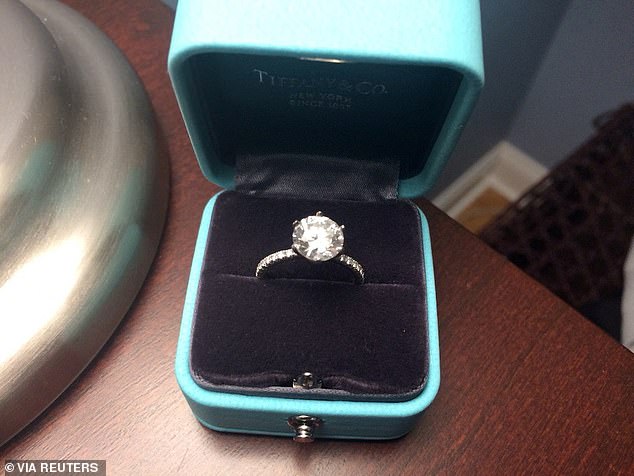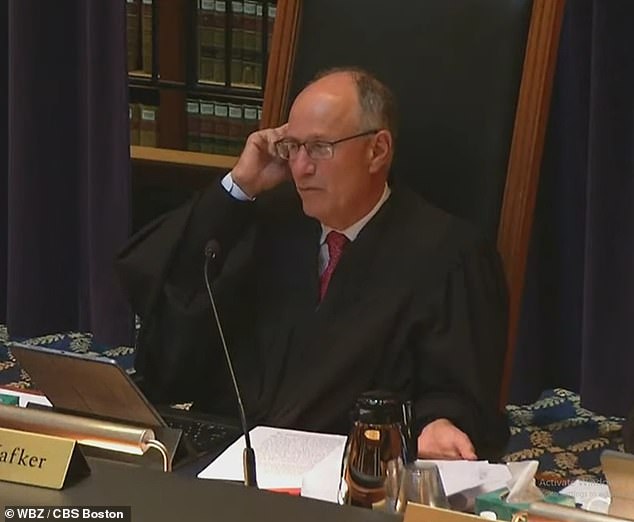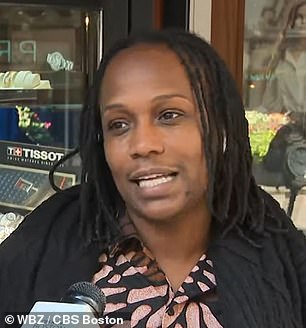Estranged couple spark heated debate after taking fight over $70k Tiffany engagement ring to Supreme Court – so who do YOU think should keep it?
An estranged Boston couple has sparked a heated debate after taking their fight over who gets to keep Tiffany’s $70,000 engagement ring to the Massachusetts Supreme Judicial Court.
Bruce Johnson, 67, and Caroline Settino, 59, called off their brief engagement in November 2017 after he accused her of cheating.
Now, seven years later, the couple is still fighting over who gets to keep the $70,000 Tiffany ring and two additional rings.
The battle has escalated all the way to the Massachusetts Supreme Judicial Court (SJC), the highest court in the state.
In the Commonwealth State, a ring is considered a ‘conditional gift’ and the giver can only get the jewellery back if he/she is not responsible for the end of the relationship.
However, this has led to a huge debate over whether or not Settino should be allowed to keep the ring, with many Bostonians saying Johnson should be given the flashy jewelry back.
“It’s the man’s,” one customer said CBS Boston“It’s cancelled, it’s all over.”
Bruce Johnson, 67, and Caroline Settino, 59, broke off their brief engagement in November 2017 after he accused her of cheating on him. Now, seven years later, the couple is still fighting over who gets to keep the $70,000 Tiffany’s ring and two additional rings

The battle has escalated all the way to the Massachusetts Supreme Judicial Court. In the Commonwealth State, a ring is considered a “conditional gift” and the giver can only get the jewelry back if they are not responsible for ending the relationship. PICTURED: The ring at the center of the dispute
“She needs to give the ring back, it’s not yours, there will be no wedding,” another told the newspaper.
However, one woman thought Settino should keep it because “he gave it to her as a gift.”
The decision now lies with the Supreme Court of Justice and it is not known when the court will make a ruling on this matter.
Johnson claims he deserved to keep the Tiffany piece because during their engagement he endured “verbal abuse” from Settino, who would often berate him for spilling a drink or “how he ate oysters,” according to legal documents.
She also allegedly called him an “idiot” and treated him like a child, he alleged.
He also said he was convinced she was cheating after he searched her phone following an argument in November 2017.
During the argument, Settino allegedly told him, “I’m a beautiful woman. I can get a man whenever I want.”
After searching her phone, he found a text message from a man he didn’t know that read, “My Bruce is going to Connecticut for three days. I need some playtime.”
Johnson interpreted the text as an invitation for sex and after listening to a voicemail in which the man said Settino “wasn’t seeing him often enough,” he broke off the engagement a few weeks later.
Settino had told Johnson the man was only a friend — a position the court upheld — but Johnson said he could not trust her, especially since previous relationships had ended due to past infidelity.
A court ruled that his accusation was false and held him responsible for the end of the relationship, which prevented him from getting the ring back. The Superior Court judge also ordered Johnson to pay $42,982 for Settino’s dental surgery that he had previously agreed to pay for, according to court documents.
On Friday, Johnson’s attorney, Stephanie Taverna Siden, argued that the decision should be reversed and her client should have the ring returned, and that Massachusetts law should be changed.

The decision is now with the SJC and it is unknown when the court will rule on the matter. Johnson was found guilty of accusing Settino of infidelity, which a court found to be false, causing the end of the relationship to be blamed on him
“Because the person who spent money or value on the ring is doing so under the condition that ‘I’m asking you to marry me, we’re going to get married, and we’re going to have a life together.’ If you turn the ring into a gift, the person who gave the ring loses the value of the ring if the marriage doesn’t happen,” she argued, according to CBS Boston.
Settino’s attorney, Nick Rosenberg, argued that instituting a no-fault conditional gift rule would be an “interpretation of a private act” and that “we don’t have conditional gifts in Massachusetts.”
In fact, lawsuits seeking the return of rings are the last remaining broken engagement lawsuits recognized by U.S. courts. This has only been the case since the 1930s, when states began abolishing the “heart balm” claims that women previously could pursue if their marriage vows were broken.
Initially, many states handled ring cases in the manner of the Massachusetts Supreme Court in 1959, which ruled that the giver of an engagement ring is entitled to its return as long as that person was not “guilty” of breaking the engagement.
Today, in most states, including New Jersey, New York, and Pennsylvania, an engagement ring is considered a conditional gift that must be returned to the giver at the end of the engagement, regardless of who is at fault. There are some exceptions, however, such as if one of the parties is still married to someone else.


This has sparked a huge debate over whether or not Settino should be allowed to keep the ring. One woman (left) agreed that Settino should be allowed to keep it because “he gave it to her as a gift.” Another (right) said, “She should give the ring back, it’s not yours, there’s no wedding.”
That approach came into vogue as states embraced no-fault divorce. Yet critics say it perpetuates gender bias. Brides’ families often foot the bill for wedding ceremonies in the U.S., but only the engagement ring can be sued if the wedding is called off.
“The ring is contingent on, ‘You’re with me, and as long as you’re with me, you’re mine,'” Settino said. “I find that archaic about the law.”
She said courts should stop interfering in regulating engagement rings. That’s exactly what the Montana Supreme Court did in 2002 when it broke new ground with a “no-returns” policy, treating the ring no differently than any other gift.
Johnson also wants to revise Massachusetts’ rules. But he urges the court to adopt the no-fault approach that most states take. His attorney did not respond to requests for comment.
Anyway, Settino said, “I’ll never wear that ring again.”
The ring, meanwhile, remains in escrow while the dispute plays out.
